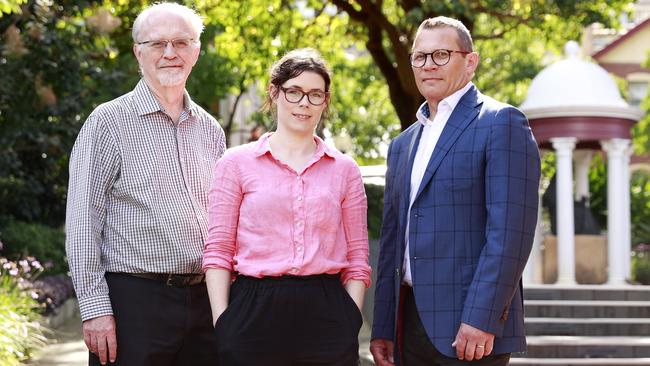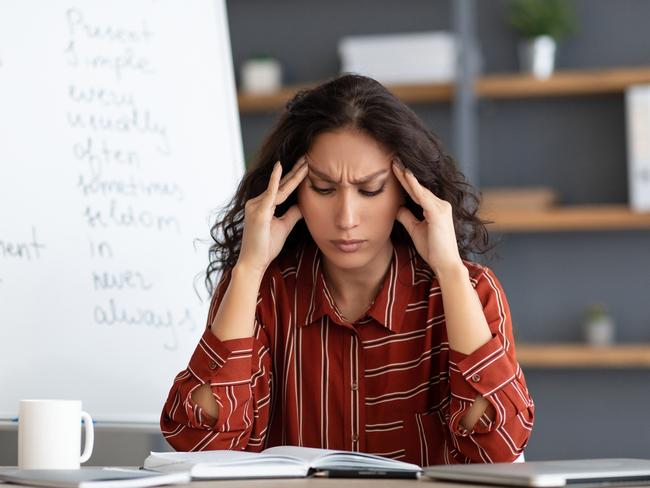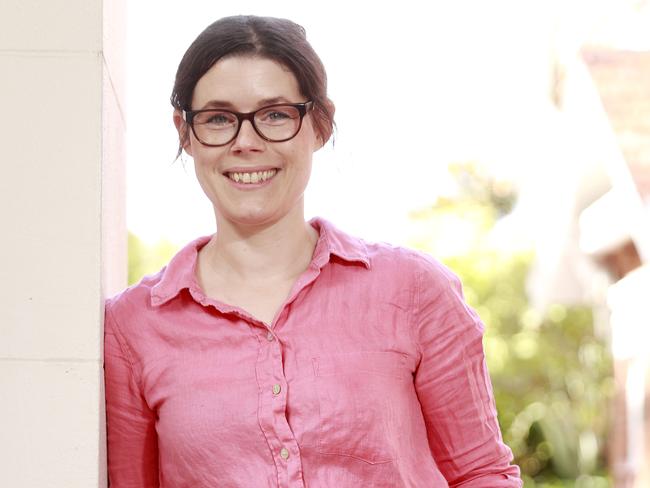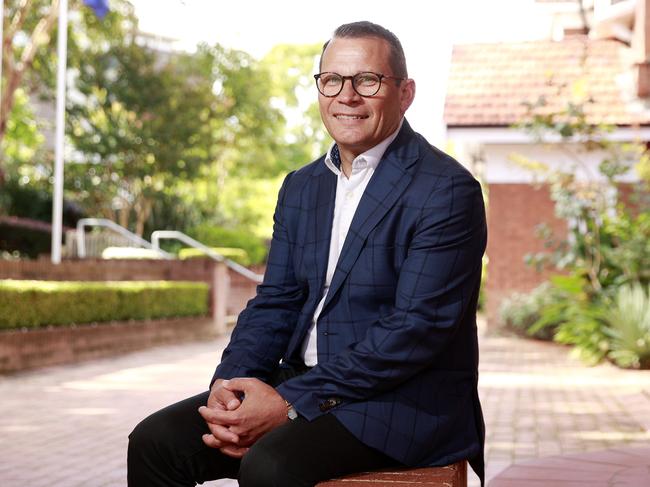School principals reveal why they’re stressed and planning to quit in new survey
Principals have revealed why they’re stressed – and their biggest health concern for their staff.
News
Don't miss out on the headlines from News. Followed categories will be added to My News.
The number of principals wanting to quit or retire early has tripled, while others fear their staff are turning to drink and drugs, a shocking new report will reveal.
An exclusive look at findings from a survey of 2500 Australian school principals shows the crisis within our schools is also impacting those at the top, as they try and manage their own declining mental health, along with that of their staff and pupils.
The annual Australian Principal Occupational Health, Safety and Wellbeing Survey due to be released next month, will show 98 per cent of school leaders said they were worried about their staff burning out.
While eight per cent flagged the issue of teachers abusing alcohol and/or drugs as a concern.
Principals said they were also concerned that staff were suffering from stress, anxiety and depression, while anxiety, school refusal, depression, stress, and self-harm were what concerned them the most about their students.

In 2019, clinical and health psychologist Dr Peta Stapleton found 17 per cent of Australian teachers met criteria for probable alcohol dependence – three times higher than the national average.
She said it appeared they were turning to substances to manage their stress and anxiety.
“At the time we thought, ‘oh wow, that’s high’, but that was before Covid, so it would most likely be even higher now,” Dr Stapleton said.
When it came to their own health, principals ranked heavy workloads and a lack of time to focus on the core responsibilities of teaching and learning as their top two concerns.
National teacher shortages ranked third – an issue that ranked 12th in the 2021 survey results, showing the issue had escalated.
Mental health issues among students and staff rounded out their top five sources of stress.
The survey, run by the Australian Catholic University, also found the number of principals stating they wanted to quit or retire early had tripled since pre-Covid.

Survey investigator and former principal Dr Paul Kidson said the results pointed to a worrying trend.
“This data shows serious dashboard warning lights flashing all over the place,” Mr Kidson said.
“These are warning signs that we have not seen so acutely before, and we have almost 2500 people saying the same thing.
“Principals’ workloads, stress caused by issues including the national teacher shortage across public, Catholic, and independent schools, and demands outside the classroom have escalated to unsustainable levels.
“We are now seeing the cumulative impact of this on principals’ health and wellbeing, and we are very concerned about the increasing steepness of those trends as they are heading in a very distressing direction.”
It found that at the time the survey was conducted last year, 65 principals planned to quit or retire early.

Co-lead investigator and leading school wellbeing expert Associate Professor Theresa Dicke said the impact of wide-ranging stressors on school leaders, including ongoing teacher shortages, was becoming acute.
She said principals needed support to help reverse the concerning trends detected by the survey.
“The fact that these stressors remain the same as in 2021 indicates the level of importance in addressing these concerns,” Assoc Prof Dicke said.
“We need to progress and implement effective solutions that support and empower principals in their vital roles.
“We have seen how education experts and political leaders can work collaboratively on solutions to the teacher shortage, and now we need to support our principals by heeding their serious and valid concerns.’’
Educational psychologist and co-lead investigator Professor Herb Marsh said the feedback was bleak, with principals sacrificing their long-term health and wellbeing for jobs that inflicted extreme stress.

Professor Marsh said not only were principals dealing with the stresses of the job, but also carried the burden of significant concerns about the health and wellbeing of staff and students.
“It is really important to highlight principals are doing a great job, but we have concerns about the rate of escalation and the cumulation of the issues, and it is reasonable to conclude that this is compounding the challenges for school leaders,” Prof Marsh said.
“Our school leaders are clearly overburdened and struggling, the question remains how long can they keep going like this?”
Sources of concern for principals:
2021 Ranking / 2022 Ranking
Sheer quantity of work 1 / 1
Lack of time to focus on teaching and learning 2/ 2
Teacher shortages 12 / 3
Mental health issues of students 3 / 4
Mental health issues of staff 6 / 5
Sources of concern principals have for their staff / percentage selected:
Burnout 98.3%
Stress 94.7%
Anxiety 82.8%
Depression 53.4%
Alcohol and/or drug abuse 7.9%
Sources of concern principals have for their students / percentage selected:
Anxiety 93.7%
School refusal 72.1%
Depression 47.1%
Stress 42.0%
Self-harm 41.6%
Source: Australian Principal Occupational Health, Safety and Wellbeing Survey
“New stresses have emerged, supercharged by teacher shortages”
OPINION
Australia’s educational goals for excellence and equity face a major hurdle.
A rapidly increasing number of principals are thinking of calling it quits, which will throw policy priorities into turmoil.
But, most importantly, it risks educational and life opportunities for thousands of Australian kids.
We know principals work long hours and that administrative burdens reduce their time for teaching and learning.
But after three years of Covid-19 and managing the impact of natural disasters, new stresses have emerged, supercharged by teacher shortages.
These shortages have been so well documented that there’s now a National Teacher Workforce Action Plan to fix them.
Ask the principal at your children’s school, and you’re likely to find classes collapsed, excursions cancelled, and teachers unable to attend professional learning opportunities.
Ask your children how many relieving teachers they’ve had – if they haven’t already complained about it.

Many principals have taken up large teaching workloads to cover classes, using up time for those administrative tasks which already crowd their diaries.
One laughed when I asked how they were going in sourcing relieving teachers to cover absences; it signalled a deep frustration that is even more acute for those in regional communities.
And, like late-night TV marketing, “just wait, there’s more”.
For the first time since our Australian Principal Occupational Health, Safety, and Wellbeing Survey started in 2011, managing students’ and teachers’ mental health are in the top five sources of stress.
It’s a perfect storm, with each source of stress feeding the others.
Supporting student learning and mental health is demanding at the best of times, but the constant disruption caused by teacher shortages increases these demands.
The likelihood of an orderly, safe, and positive learning environment diminishes when there isn’t enough staff.
It’s not surprising an increasing number of school leaders – government, Catholic, and independent – are questioning whether they have enough fuel in the tank to keep going.
The problem will not be fixed by “thank you” notes alone.
Their health and wellbeing are suffering far more than we previously thought. We need to act before their intentions to leave are realised.
Dr Paul Kidson, former principal and senior lecturer at Australian Catholic University.
More Coverage
Originally published as School principals reveal why they’re stressed and planning to quit in new survey
Read related topics:Best in Class





